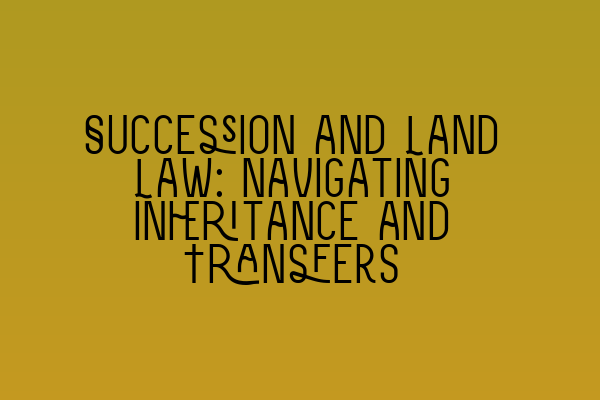Succession and Land Law: Navigating Inheritance and Transfers
When it comes to property law, one of the most important aspects to consider is succession and land law. Understanding the rules and regulations surrounding inheritance and transfers is crucial to ensure a smooth and effective transfer of property rights. In this article, we will explore the key concepts and principles of succession and land law, and provide you with expert guidance on navigating this complex area.
What is Succession and Land Law?
Succession and land law refers to the legal framework that governs the transfer of property rights from one individual to another upon death. It encompasses various rules and principles that dictate how property is inherited, transferred, or disposed of, including the rights and obligations of beneficiaries and executors.
Whether you are an individual planning your estate, a family member dealing with the inheritance process, or a legal professional advising clients, having a solid understanding of succession and land law is essential.
The Importance of Succession and Land Law
Succession and land law play a crucial role in ensuring the proper distribution of assets and property rights after an individual’s death. It provides a legal framework that aims to protect the interests of all parties involved and prevent conflicts and disputes.
By understanding succession and land law, you can ensure that your estate planning is thorough and effective. This includes making clear and valid wills, creating trusts, and taking advantage of tax planning strategies to minimize any potential liabilities.
Inheritance and Transfers: Key Concepts
Let’s dive deeper into some key concepts and principles within succession and land law:
Intestate Succession
When an individual dies without leaving a valid will, their estate is distributed according to the rules of intestate succession. These rules vary depending on the jurisdiction and can result in the assets being divided among family members, including spouses, children, and other relatives. Understanding the rules of intestate succession is vital to ensure a fair distribution of the estate.
Testamentary Dispositions
Testamentary dispositions refer to the transfer of property rights through a valid will. A will is a legal document that outlines how a person’s assets and property will be distributed upon their death. Ensuring that your will is carefully drafted and executed is essential to avoid any potential challenges, disputes, or unintended consequences.
Transfer of Property
The transfer of property can occur during an individual’s lifetime or as a result of their death. Various legal mechanisms, such as gift deeds, sale deeds, or transfers under trusts, can facilitate the transfer of property rights. Understanding the different methods of property transfer and their implications is crucial to ensure a seamless transfer process.
Rights and Obligations of Beneficiaries
Beneficiaries are individuals who are entitled to receive property or assets from an estate. They have certain rights, such as the right to be informed about the estate’s administration, and obligations, such as paying any applicable taxes or debts. Understanding the rights and obligations of beneficiaries is essential for both beneficiaries themselves and executors responsible for administering the estate.
Seeking Professional Advice
Succession and land law can be complex and nuanced, and seeking professional advice is highly recommended to navigate this area effectively. By consulting with a qualified solicitor who specializes in property law, you can ensure that your estate planning or inheritance matters are handled with expertise and care.
If you are preparing for the SQE (Solicitors Qualifying Examination) and require assistance in preparing for the Property Law & Land Law section, SQE Property Law & Land Law at SQE Property Law & Land Law SQE is a leading educational institution that offers comprehensive preparation courses for the SQE exams. Their courses cover all the essential topics and provide practice exams and mocks to ensure you are well-prepared.
Additionally, if you are looking for practice exam questions, mock exams, or want to know the exam dates for the SQE, SQE Property Law & Land Law has a variety of resources available on their website. Make sure to check out their SQE 1 Practice Exam Questions and SQE 1 Practice Mocks FLK1 FLK2 for exam preparation, as well as their SQE 2 Preparation Courses and SQE 1 Preparation Courses for a comprehensive study plan.
In conclusion, succession and land law are vital aspects of property law that govern the transfer of property rights. Understanding the key concepts and principles surrounding inheritance and transfers is essential for effective estate planning, proper distribution of assets, and avoiding potential conflicts or disputes. By seeking professional advice and utilizing available educational resources, such as those offered by SQE Property Law & Land Law, you can ensure you have the knowledge and skills necessary to navigate this complex area successfully.
